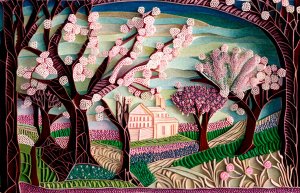Presented By: School of Music, Theatre & Dance (SMTD)
The Cherry Orchard
The Department of Theatre & Drama

Anton Chekhov’s The Cherry Orchard is considered one of the great classic works of Russian theatre, having been translated into countless languages and produced all over the world. Some of the greatest American playwrights – such as Arthur Miller, David Mamet, and Eugene O’Neill – were directly influenced by Chekhov.
After a prolonged absence following the death of her son, noblewoman Lyobov Ranevskaya returns to her estate and finds the cherry orchard on the estate in full bloom. Despite this outward sign of prosperity, her home is on the verge of financial ruin. Along with her brother, Gaev, Lyobov struggles to maintain the façade of gentility as their world crumbles around them.
Written by Anton Chekhov
Translated by Paul Schmidt
Directed by Daniel Cantor
FUN FACTS: Is The Cherry Orchard a comedy or a tragedy? It depends on who you ask. According to artlark.org, “The original intention of Chekhov was for The Cherry Orchard to be a comedy; yet, [Constantin] Stanislavsky [famous actor/director and creator of the eponymous Stanislavsky method, known as ‘method acting’] turned it into a tragedy.” Russian literature scholar Svetlana Evdokimova quotes Stanislavsky as saying, “‘This is not a comedy, not a farce, as you wrote; it is a tragedy, whatever outlet for a better life you may have offered in the last act… I hear you saying: “Wait a minute, but this is a farce…” No, for an ordinary person this is a tragedy.’” Yet this conflict is what makes The Cherry Orchard such good theatre. As Evdokimova says, “Clearly, the source of the comic lies not in the play’s fabula or situation, not in what happens, but in how it happens and to whom it happens. The enigmatic, captivating, and almost mesmerising effect that The Cherry Orchard continues to exert on its audience is to be found in its good-humoured but foolish protagonists – both charming in their gullibility and pathetic in their utter confusion.”
After a prolonged absence following the death of her son, noblewoman Lyobov Ranevskaya returns to her estate and finds the cherry orchard on the estate in full bloom. Despite this outward sign of prosperity, her home is on the verge of financial ruin. Along with her brother, Gaev, Lyobov struggles to maintain the façade of gentility as their world crumbles around them.
Written by Anton Chekhov
Translated by Paul Schmidt
Directed by Daniel Cantor
FUN FACTS: Is The Cherry Orchard a comedy or a tragedy? It depends on who you ask. According to artlark.org, “The original intention of Chekhov was for The Cherry Orchard to be a comedy; yet, [Constantin] Stanislavsky [famous actor/director and creator of the eponymous Stanislavsky method, known as ‘method acting’] turned it into a tragedy.” Russian literature scholar Svetlana Evdokimova quotes Stanislavsky as saying, “‘This is not a comedy, not a farce, as you wrote; it is a tragedy, whatever outlet for a better life you may have offered in the last act… I hear you saying: “Wait a minute, but this is a farce…” No, for an ordinary person this is a tragedy.’” Yet this conflict is what makes The Cherry Orchard such good theatre. As Evdokimova says, “Clearly, the source of the comic lies not in the play’s fabula or situation, not in what happens, but in how it happens and to whom it happens. The enigmatic, captivating, and almost mesmerising effect that The Cherry Orchard continues to exert on its audience is to be found in its good-humoured but foolish protagonists – both charming in their gullibility and pathetic in their utter confusion.”